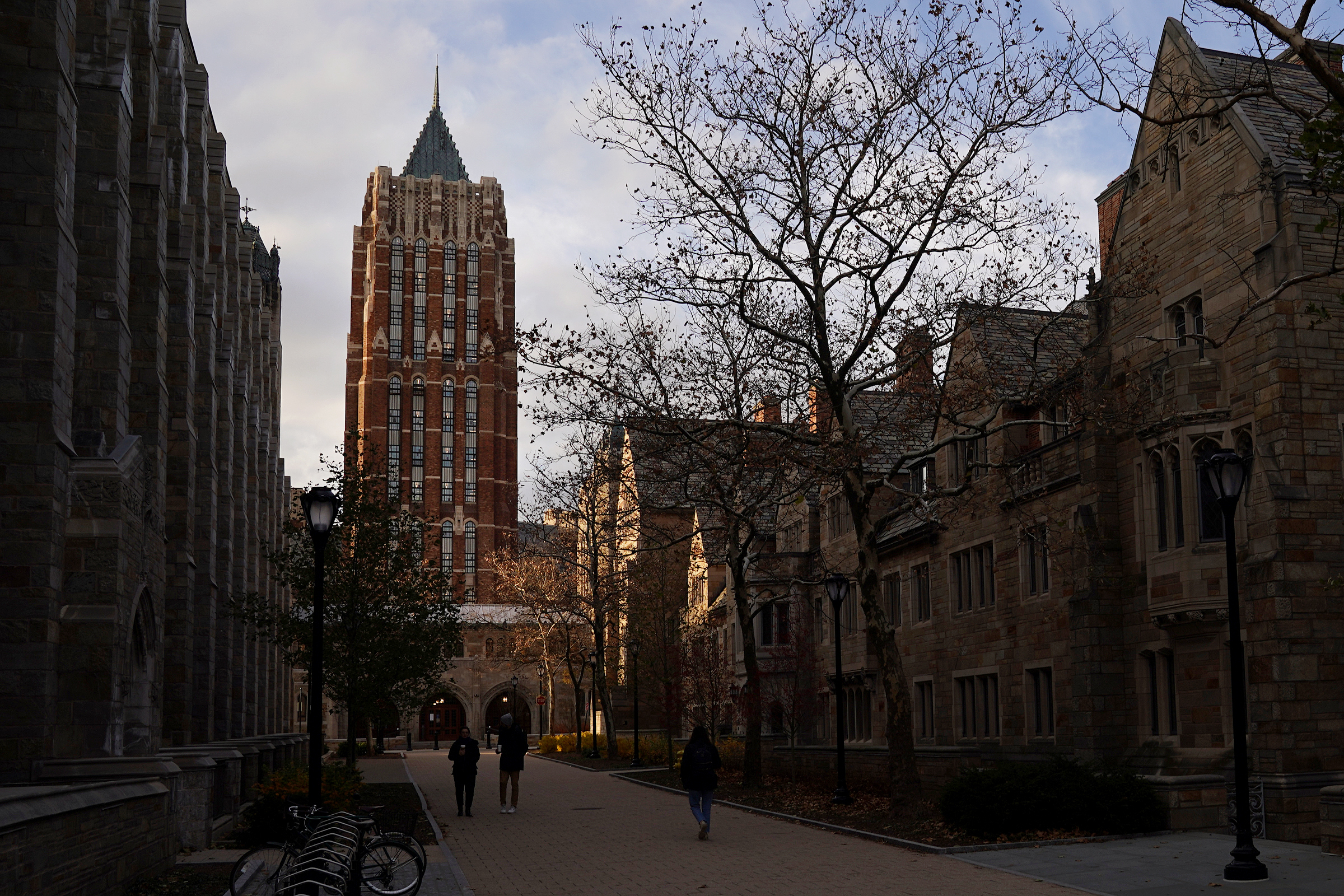Yale employees pour over $750k into 2024 elections, nearly all to Democrats
As election season heats up, 97.26 percent of Yale-affiliated donations this year have gone to Democrats.

Tim Tai, Senior Photographer
Yale University employees have contributed more than $750,000 to political campaigns and organizations in 2024, marking a significant surge in donations compared to previous years.
An analysis of more than 7,000 Federal Elections Committee filings conducted by the News highlights a clear political lean — 97.26 percent of donations from Yale affiliates went to Democrats, while only 2.74 percent were given to Republicans.
Approximately 2,100 filings came from current Yale professors, assistant professors and associate professors, who collectively donated around $413,000. This figure represents more than three times the amount donated last year.
The surge in donations puts Yale in the top 2 percent of organizations in terms of total employee political contributions, according to OpenSecrets, a nonprofit that tracks campaign contributions and lobbying.
Federal campaigns receive most donations
Filings indicate that roughly $260,000 of donations went to Vice President Kamala Harris’ campaign, including funds transferred to the Harris campaign from the Joe Biden campaign. Former President Donald Trump saw significantly less financial support, collecting just under $5,500 from Yale affiliates.
Other Republican presidential hopefuls, such as Ambassador Nikki Haley, Gov. Chris Christie and Vivek Ramaswamy LAW ’13, received even fewer Yale-affiliated donations totaling $4,700, $360 and slightly over $300, respectively, before dropping out of the race.
In the 2024 election cycle, 163 Democratic candidates for the House of Representatives received donations from Yale affiliates, compared to only nine House Republican candidates.
Similarly, 43 Democratic Senate candidates received financial support, compared to four Republican and two independent candidates.
Connecticut Sen. Chris Murphy, who faces reelection this year, received $70,000, nearly matching the $80,000 contributors donated to him between 2013 and 2020, according to a 2020 News analysis.
Congresswoman Rosa DeLauro, who represents the New Haven area and is also up for reelection this year, received $36,000 in contributions.
OpenSecrets estimates that 75 percent of donations from Yale employees to congressional candidates supported incumbents. In total, 172 House and 49 Senate campaigns benefited from Yale-affiliated contributions.
ActBlue, a fundraising platform dedicated to supporting left-leaning and Democratic politicians and campaigns, saw a surge in contributions this year from Yale affiliates, receiving 5,844 unique donations compared to 724 last year. In contrast, WinRed, the fundraising counterpart for Republicans, reported 140 contributions, a significant increase from the mere three it received last year.
Yale’s largest political donor
Barry Nalebuff, a School of Management professor, continues to rank among Yale’s top political donors. Last year, he contributed $25,000 to the Biden Victory Fund. This year, he has already donated $34,700 to the Democratic National Convention and more than $35,000 to different Harris campaign funds.
“I cheat a little bit and just give to the DNC. I figure that they know better than I do,” Nalebuff said. “It saves me from doing a lot of homework, and it may be better for specific, needy cases, but it sort of requires a lot of work to do that, and I let the DNC do that.”
Although he attended several fundraising events throughout the 2024 election cycle, Nalebuff wished candidates for office would spend more time on governance instead of soliciting donations.
Nalebuff believes that the only “redeeming” aspect of fundraisers, however, is that one can learn more about candidates and their accomplishments and “get more excited and share that enthusiasm with other voters.”
“I went to an LGBTQ+ fundraiser for [the] Biden [reelection campaign] in New York City and it really is remarkable what he has done. He’s been a fantastic ally,” Nalebuff said.
Nalebuff also views donations as a tool for political influence.
After watching the Biden-Trump presidential debate this past summer, Nalebuff did not feel entirely certain about Biden’s reelection campaign. He called former DNC Treasurer Andy Tobias and shared his thoughts about the future.
“Why did I end up donating so much? It wasn’t necessarily my intention,” Nalebuff said. “After the debate, I [felt that it was] not a happy situation, and I called [Andy Tobias] … and said that I would double my donation if Biden dropped out.”
In July, President Biden announced his withdrawal from the 2024 presidential election, paving the way for Harris’ candidacy, for which Nalebuff jokingly takes partial credit.
Other Yale Political Giving Trends
According to a report from the Yale Office of Institutional Research, Yale University currently employs 11,590 staff members and 5,499 faculty members — a total of 17,089 employees. Of these, 1,234, or 7.2 percent of Yale’s workplace, were unique contributors in this past year.
When asked about Yale’s employee donation statistics, Shiro Kuriwaki, an assistant professor in the department of political science, expressed uncertainty.
He noted that some political donations go undisclosed, meaning that the publicly available figures from the FEC might not capture the full extent of political contributions from Yale affiliates.
According to OpenSecrets, groups have spent roughly $1 billion in dark money — political spending from undisclosed sources — to influence elections since 2010. This surge followed the Supreme Court’s decision in Citizens United v. FEC, which allowed nonprofits to contribute to election campaigns without disclosing their donors.
Under current federal law, individuals may donate up to $3,300 per election to a candidate’s campaign committee. Additionally, individuals may donate up to $5,000 to a political action committee and $41,300 to a national party committee. Some individuals bypass these limits by donating to Super PACs, which can raise and spend unlimited amounts of money, as long as they operate independently from the candidates they support.
“American politics is increasingly reliant on donations to fund campaigns,” Kuriwaki said. “If one side gets more donations to compete [with] … the other party has an incentive to get donations.”
Americans will cast their ballots for the next U.S. president on Nov. 5.







